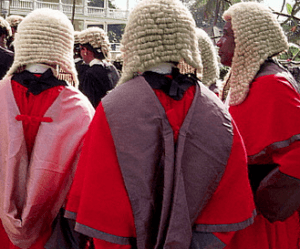Supreme Court to rule on Justices Dery, Ayisi Addo’s salaries
 The Supreme Court has fixed May 26 to deliver judgment in the case in which two judges implicated in the Judicial Bribery Scandal are challenging the Judicial Council for withholding part of their full salaries.
The Supreme Court has fixed May 26 to deliver judgment in the case in which two judges implicated in the Judicial Bribery Scandal are challenging the Judicial Council for withholding part of their full salaries.
Justice Paul Dery and Justice Gilbert Ayisi Addo had sued the Judicial Council, the Chief Justice and four other institutions for serving them notices to slash their salaries by half and also suspend payment of their allowances except rent.
The two described the decision of the Judicial Council as unconstitutional.
When the court sat on Tuesday, it struck out the names of four other institutions on the writ namely the Judicial Secretary, Director of Finance of Judicial Service, the Paymaster and the Controller and Accountant General.
According to the Court, it would be superfluous to put the names of the four on the writ.
The court, however, after adopting memorandum of issues from parties fixed a date to deliver its judgment.
Ms. Ivy Vanderpuiye, Senior State Attorney, represented the Judicial Council and the Chief Justice while Mrs Sika Abla Addo represented the plaintiffs.
The plaintiffs were part of the 12 High Court judges and 22 circuit court judges and magistrates captured by investigative journalist Anas Aremeyaw Anas, in video recordings collecting bribes from litigants to pervert the course of justice.
A few days after the committee’s exercise, Justices Paul Uuter Dery and Gilbert Ayisi Addo, who are still under investigation, received a letter from the judicial council, which stated that they would receive half salaries and that was to take immediate effect.
The implicated judges were therefore seeking a declaration that the decision of the Judicial Council in December 2015, contained in letters dated January 8 to 11, 2016 purporting to suspend payments to the plaintiffs of all their allowances except rent was inconsistent in law.
According to the plaintiffs the move was also in contravention of Article 127 (5) of the 1992 Constitution and therefore unconstitutional, null and void, hence their praying of the court for an order to nullify the decision of the council.
Article 127 (5) reads: “The salary, allowances, privileges and rights in respect of leave of absence, gratuity, pension and other conditions of service of a Justice of the Superior Court or any judicial officer or other person exercising judicial power, shall not be varied to his disadvantage.”
Source: GNA
